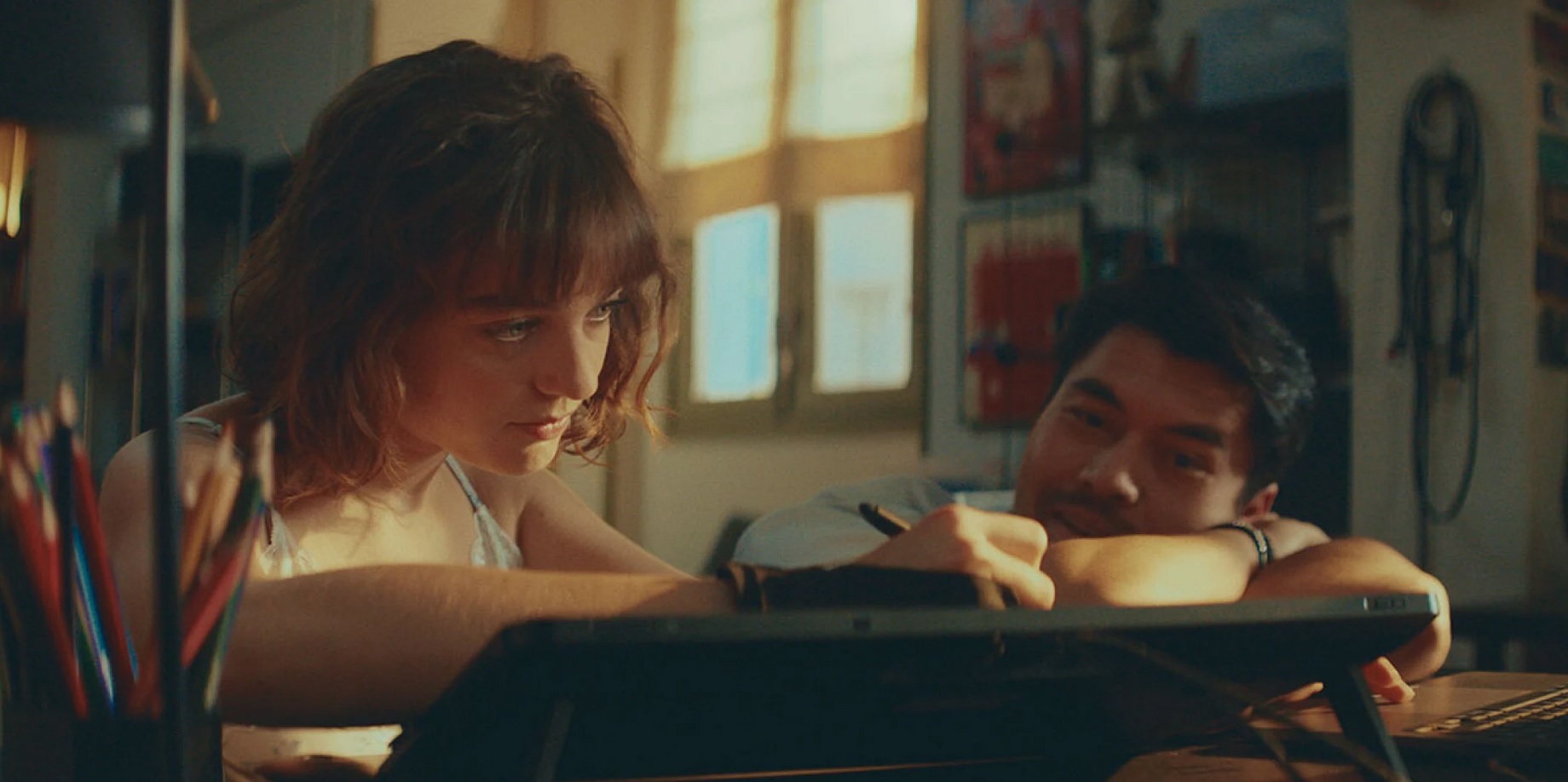Director: Nacho Vigalondo
Writer: Nacho Vigalondo
Stars: Henry Golding, Beatrice Grannò, Aura Garrido
Synopsis: Follows a man as he joins a sleep trial that allows him to rebuild his life with his girlfriend who died in an accident through the use of lucid dreams.
It’s hard to judge someone who is grieving; each step in their process is hopefully one towards healing in a healthy manner. But what happens when you lose the one person you love in a horrific accident? How far is too far when trying to keep their presence alive? Nacho Vigalondo’s newest film, Daniela Forever, attempts to answer how far is too far, showing how dangerous it is to live in the past without the ability to let go. In our current society, there is this constant need to bring our loved ones back either through technology or even the use of AI, this film should be a knockout of the park. But Daniela Forever, even for all its interesting editing and stylistic choices, chooses to stick with twist after twist instead of saying anything meaningful about technology shaping grief.
When Nicolas (Henry Golding) loses his girlfriend Daniela (Beatrice Grannò) in an accident, his life is completely flipped on its head. His life begins to fall apart as he spirals deeper and deeper into depression. Places, activities, and even people he once found joy in no longer render the same feelings. A once socially active man turns into a hermit, and with a successful career as a DJ, being social is part of the job. Dirty dishes and clothes litter his once lively apartment filled with love; now it looks more like a college frat house. Losing Daniela turns Nicolas to desperation, wanting to spend more time with her but uncertain on how to do so. When the opportunity arises that would allow Nicolas to free himself of the pain of grief, he takes it.
Much like our current social climate, Daniela Forever makes the use of drugs enticing, especially to those who are looking to fill a void. Nicolas agrees to take this experimental drug to relieve himself of hisconstant anguish. And although the experimental drug in the film is an exaggerated process, it resonates as a possible option for our future. Who wouldn’t want the choice of being able to see, and even interact with someone who left their life too soon? Nicolas takes his first dose, and he is sent to a lucid world where Daniela is still alive. He can relive moments with Daniela from their past, like the first time they met at an event he was DJing. But that’s not where he stops, his continued use of the drug has him pushing the agreed upon terms of service as he attempts to create new memories that challenge fate.
Daniela Forever plants interesting seeds when it comes to grief, and the lengths it takes a person. Weaving his way through this new drug induced dream world, and his sober reality, Nicolas’s two worlds begin to mix. The most compelling bits where Nicolas is back with Daniela are sure to evoke a tear or two, but the script doesn’t live up to its early potential. When the two are recounting their first time seeing each other there’s a beautiful humanity to it, both are unsure of the moments leading up to it, and even who said hello first, all that matters in their memories is that they found one another. Their connection is deeply rooted in their shared interests, but as the film progresses there’s less of a focus on their actual relationship and more on how Nicolas can make this last. When his supply of drugs runs low, the film throws twist after twist that takes the focus away from why Nicolas chose to do this in the first place.

There’s no denying that Golding was made for romance films; he’s got an undeniable charm that Daniela Forever uses to sweep Daniela, and subsequently us, off of our feet. The film focuses a lot on his character, which is understandable given it’s from his perspective, but we don’t really get to know him outside of his grief. For a film named after a main character, Grannò is given little to work with, as the most we see of her she is essentially a void of her former self, with her thoughts and feelings being programs that Nicolas can override when he deems fit. Her performance is serviceable in the role of a woman with few words or emotions but mostly comes off as forgettable. This showcases Nicolas as a selfish man who doesn’t really seem to care about what his partner says or does, just as long as it doesn’t interfere with his end goals; and when it does, Nicolas makes sure that any agency Daniela has in his drug-induced dreams is gone.
Daniela Forever, as a visual form, is where it gets the most inventive and the most interesting. When he’s inside his dream world, it’s vibrant, fresh, and a clearer picture than when Nicolas is in reality, which has had the color almost sucked out of it with its drab grading, mostly due to the way the film is shot. Nicolas’s reality is shot in a smaller ratio, 4:3 to be exact, making it feel like his grief is closing in on him. His dream world is easy for him to maintain, even manicuring it to his wants and needs; his imagination is limitless, letting him fill the space of his dream world any way he chooses. The film often focuses a lot on establishing the differences in these two worlds and how Nicolas becomes increasingly possessive of Daniela, and the film, much like Nicolas, ends up treating Daniela like an object taking up space in a dream rather than a person he loves.

As a result, Daniela Forever is a mixed bag; what could be an impactful story about letting our lost loved ones rest turns into an overly humorous dive into a man’s inability to respect his partner’s thoughts or feelings, even in his own dreams. While the film speed runs Nicolas’s growth, it comes a little too late, leaving audiences to wonder who Daniela even was.






